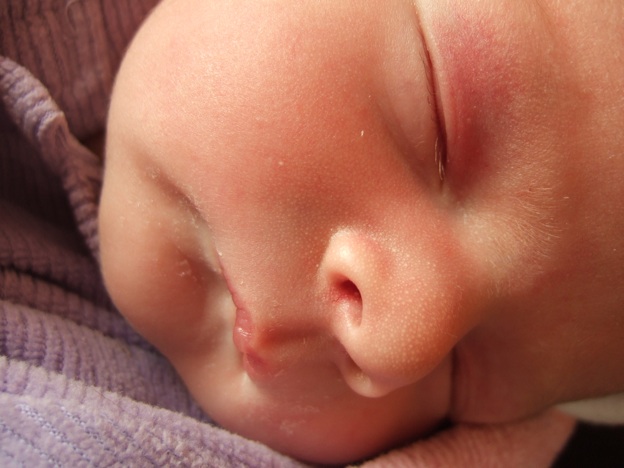SingaporeMotherhood | Baby & Toddler
November 2011
Baby’s Sick! Help!
Dealing with a sick baby can be very stressful, especially for first-time parents. Babies can’t talk. They cannot tell you if they are feeling dizzy, queasy, or wheezy. But you will know when they are uncomfortable. They cry, they puke, and they won’t let you go! In the meantime, what can you do? Here’s a simple guide to the common ailments that babies go through, tips on what you can do to ease your little one’s discomfort, and when you should stop thinking, drop everything, and roll out the door to the doctor’s.
Common Cold
Baby is sniffing, her nose is runny and congested, her eye watery, and her mucus, which was clear at first, has turned yellow or green. She may also have a low grade temperature (about 38°C), be coughing, sneezing, refusing to eat even her favourite foods, and having difficulty sleeping.
[banner][/banner]
What to do Most colds resolve on their own. If there are no complications, it should go away in a week. How to make baby feel better in the meantime? Lots of TLC always works. On top of that, make sure she gets plenty of fluids. Nose drops or nasal aspirators can help de-clog the nose, and using a humidifier in the bedroom can soothe nasal passages and help her sleep better.
See the Doc If your child is younger than three months, if her temperature shoots up to 38.9°C or above, if she is not drinking, if she coughs for over a week, complains of ear pain, or if she has any other symptoms that worry you.
Colic
It’s like magic: every day, at that particular witching hour, baby opens up her mouth and cries – non-stop. She can go on for more than three hours each time and it breaks your heart to see your angry, angry baby, curled up like a prawn, with fists tightly clenched and knees close to the chest, screaming away. Worse, you’re ready to scream too.
What to do Hang in there. Baby’s digestive system is immature and her stomach no larger than the size of a golf ball so keep feeds small and always burp baby well after a feed. If you are breastfeeding, avoid eating gas-inducing food such as cabbages and beans. Some mums have found that rubbing Ruyi oil on baby’s tummy can helps. In the meantime, get help – for yourself.
See the Doc You don’t really need to, as this will usually pass after six months once baby’s digestive system matures. If baby’s discomfort is too much to bear, bring her to the doctor, who can prescribe colic medications.
Coughs
When she’s barking like a seal instead of cooing like a dove, there’s definitely something wrong. She may have a sore throat, or be coming down with a runny nose. Coughs are the body’s way of eliminating phlegm and other nasties from the throat and airways.
What to do Offer plenty of fluids but don’t expect immediate recovery: coughs can continue for up to a week.
See the Doc If baby is under four months, or vomits, or has a fever, go to the doctor. If your child is older, and you are comfortable to do so, let the cough run its course. The American Academy of Pediatrics does not recommend the use of cough medicines for children under age six unless prescribed by a doctor.
Constipation
Contrary to expectation, not all babies poop everyday. Baby is constipated if she has hard, dry stools and does not empty her bowels with her usual frequency.
What to do Again, offer lots of fluids. You can try massaging baby’s tummy gently in a clockwise direction, moving out from the belly button. Placing baby on her back and cycling her legs can also help, as this gets the stomach muscles and intestines moving. If baby is drinking formula milk, check that it is being prepared properly. If baby is on solids already, offer fruit like pureed pears or prunes.
See the Doc If baby is in obvious discomfort, passes bloody stools, or vomits.
Fever
Babies have a higher temperature than adults. Generally, doctors would consider a baby having a fever only if her temperature has reached 38°C or more. Apart from this, baby may also look flushed, and feel hot to touch.
What to do Check that she is not over-bundled with clothes. The rule of thumb is one layer more than what you yourself would wear. Give plenty of fluids to prevent dehydration. Give her infant paracetamol and let her sleep. Fevers are the body’s way of fighting an infection so let baby rest – no play dates for the time being! – and let her body heal.
See the Doc If baby is less than six months. Also get the clinic if baby shows signs of the following: irritability, lethargy, a sore throat, ear pain, vomiting, and listlessness.
Diarrhoea
When baby is passing loose, unformed, greenish stools, she has diarrhoea. Diarrhoea could be caused by a virus or an infection.
What to do Give extra fluids and lots of rest. Make sure everyone’s hands are properly washed. Ensure that baby’s toys, teethers, and other things that she may pick up and gum in her mouth are washed regularly.
See the Doc If baby passes loose stools more than six times in 24 hours or if she vomits too often (these could lead to dehydration), has blood in her stools, has a high temperature, dry mouth, sunken eyes, of if the fontanelle (soft spot at the top of baby’s head) is sunken.
All content from this article, including images, cannot be reproduced without credits or written permission from SingaporeMotherhood.
Follow us on Facebook, Instagram, and Telegram for the latest article and promotion updates.






